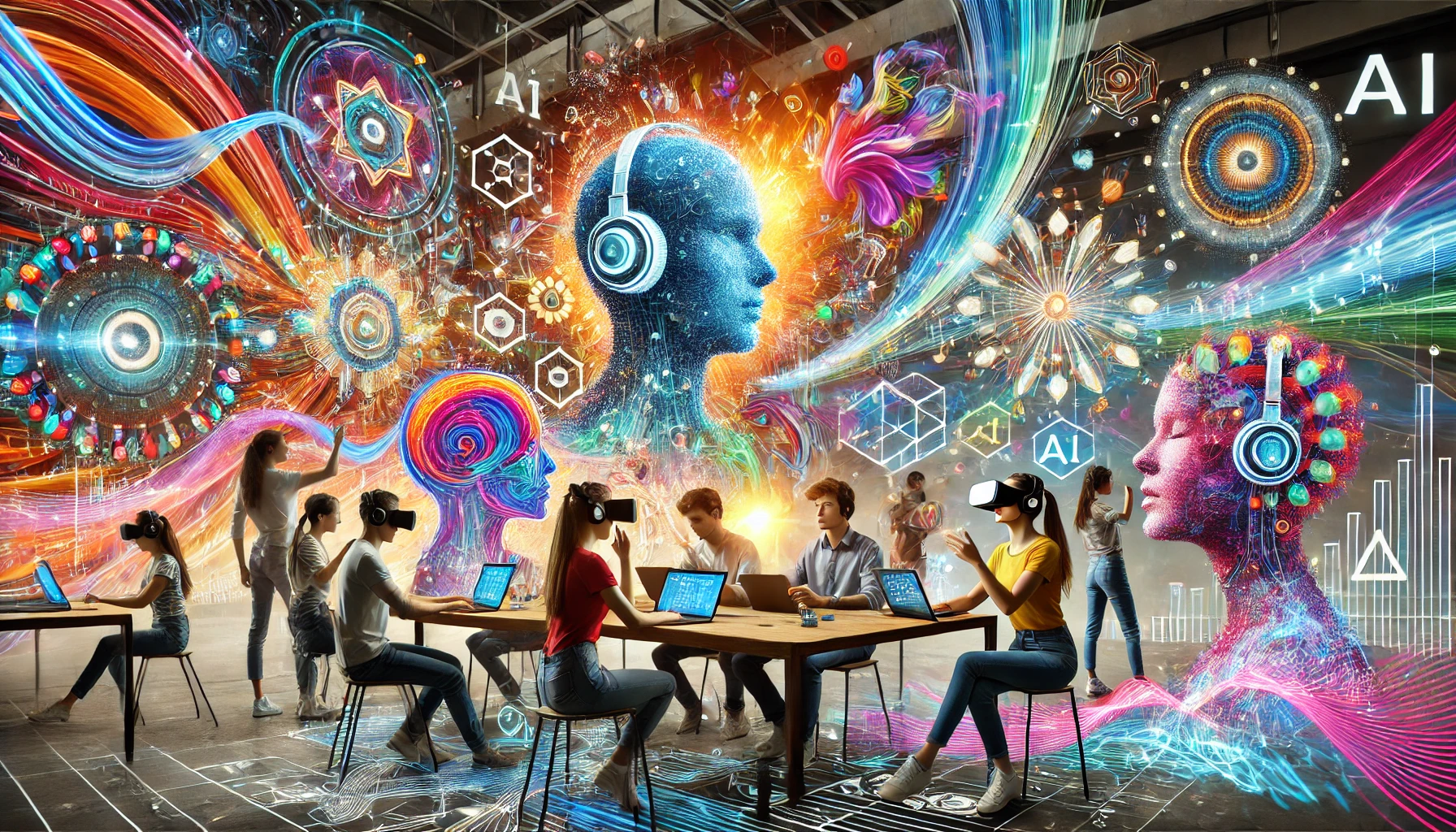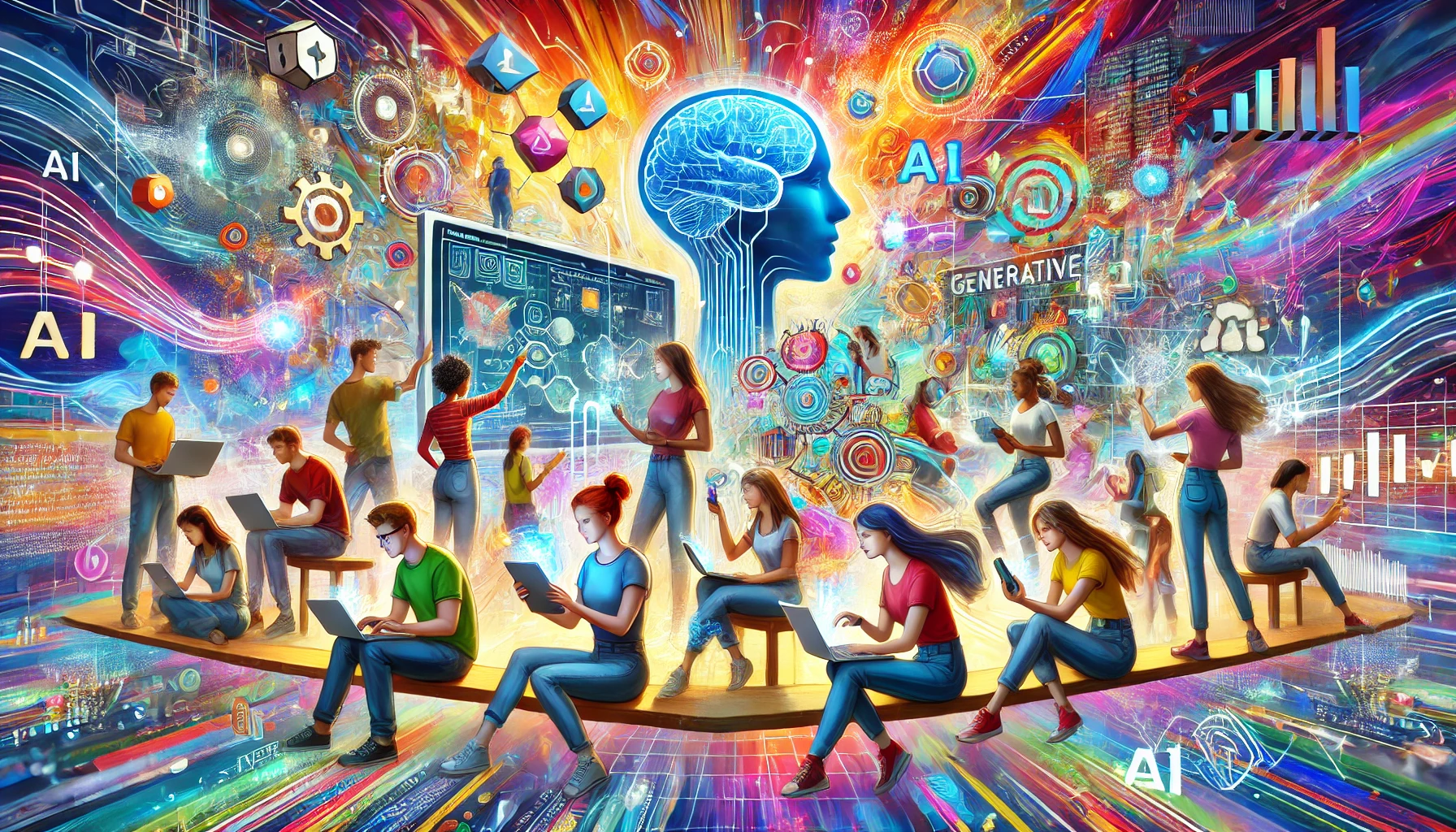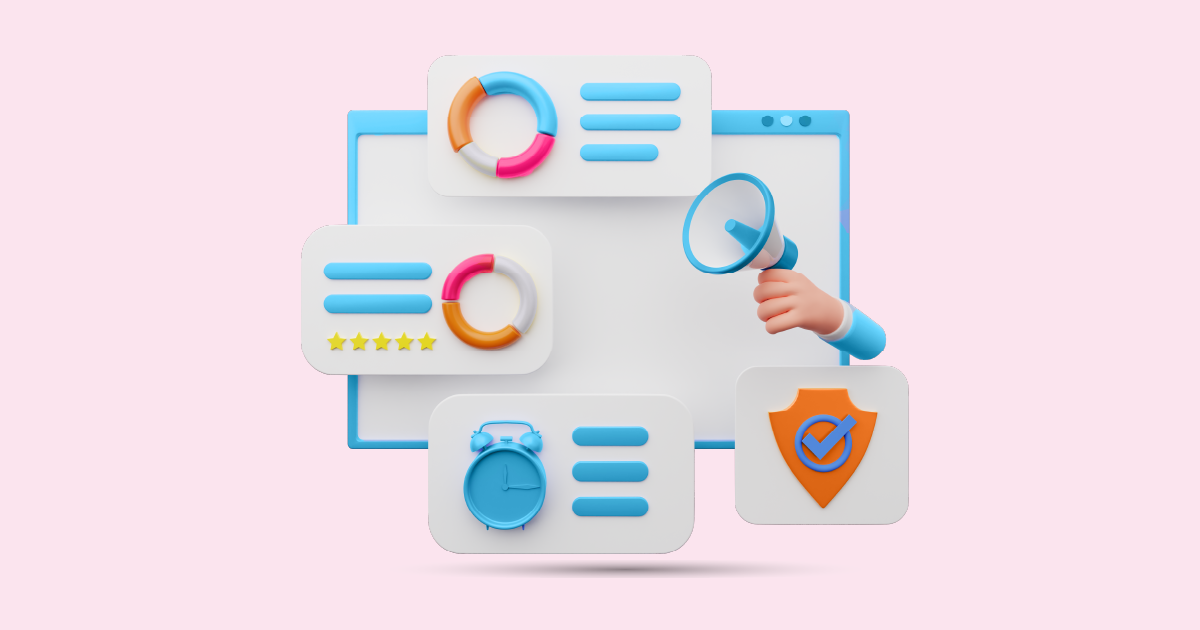The world is undergoing a technological revolution, and Gen Z is at the forefront of it. Born between the mid-1990s and early 2010s, this tech-savvy generation is growing up with cutting-edge innovations like generative AI that are reshaping industries, communication, and even creativity. But what is Gen Z, and how does generative AI fit into their world? Let’s dive in to find out how this generation is embracing and transforming the potential of artificial intelligence.
Gen Z and Generative AI: Shaping the Future of Creativity and Innovation

Who is Gen Z?
Defining Gen Z
Gen Z, often referred to as “digital natives,” is a generation that has never known life without the internet. They grew up with smartphones, social media, and instant access to information. Unlike previous generations, Gen Z has a unique relationship with technology—they don’t just use it; they expect it to evolve constantly. They are always on the lookout for the next big thing, and AI is a natural extension of their digital lifestyle.
Gen Z’s Technology Adoption
Gen Z’s affinity for technology means they are not just passive consumers but active creators. Whether it’s through TikTok videos, Instagram filters, or AI-generated artwork, they love exploring new ways to express themselves. Generative AI, with its ability to create text, images, and even music, aligns perfectly with this creative drive, giving them powerful tools to bring their ideas to life.
What is Generative AI?
Overview of Generative AI
Generative AI refers to artificial intelligence systems that can create content—anything from text to images, sounds, and even entire experiences. Unlike traditional AI, which follows a set of predefined rules, generative AI uses algorithms to learn patterns and produce new, original content based on the data it’s trained on.
How Generative AI Works
Generative AI operates through advanced machine learning models, particularly neural networks, that mimic how the human brain processes information. These networks learn from vast datasets to identify patterns and, in turn, generate new content that mirrors those patterns.
Key Technologies Behind Generative AI
- Machine Learning: At its core, generative AI relies on machine learning, where the system improves over time by analyzing more data.
- Neural Networks: These networks simulate human brain function and are essential in training AI models to understand and create realistic content.
Applications of Generative AI
Generative AI has a wide range of applications, some of which are transforming how Gen Z interacts with the digital world:
- Text Generation: AI systems like ChatGPT can create human-like text for stories, blogs, or conversations.
- Image Creation: Tools like DALL-E generate stunning visuals based on simple text prompts.
- Music and Video: AI can compose original music tracks or help in video editing and creation, giving Gen Z creators more room to innovate.
The Intersection of Gen Z and Generative AI
Why Gen Z is Embracing AI
So, why does Gen Z love generative AI so much? The answer is simple: personalization. Gen Z expects their digital experiences to be tailored to their preferences, and AI’s ability to customize everything from news feeds to creative outputs fits right into that expectation. It’s not just about using technology; it’s about using technology that adapts to them.
Gen Z’s Expectations from AI
- Personalization: From music recommendations to AI-generated artworks, Gen Z loves content that feels custom-made for them.
- Innovation: Gen Z is always looking for what’s next, and AI provides endless possibilities for innovation.
- Efficiency: Why spend hours editing a video when AI can do it in minutes?
How Generative AI is Shaping Gen Z’s Creativity
Generative AI isn’t just a tool for efficiency; it’s also sparking a creative revolution among Gen Z. With AI-powered tools, young creators can produce high-quality content that would have taken much longer to make manually.
Social Media Content Creation
Social media platforms like TikTok and Instagram are playgrounds for AI creativity. Gen Z is using AI tools to enhance their content, whether it’s generating catchy captions, editing videos, or creating unique visual effects.
AI-powered Art and Music
Generative AI tools are also giving rise to a new genre of AI-assisted art and music. Gen Z is collaborating with AI systems to create pieces that push the boundaries of traditional art forms, blending human creativity with machine learning.
Generative AI in Education and Career for Gen Z
AI in Learning and Skill Development
For Gen Z, learning isn’t limited to textbooks and classrooms. AI-powered platforms are helping this generation develop new skills, from coding to design, in more engaging and personalized ways. Interactive learning experiences driven by AI make education more accessible and adaptable.
AI-driven Career Opportunities for Gen Z
Generative AI is also opening up new career opportunities. From AI model trainers to content creators using AI tools, there are emerging job roles that cater specifically to Gen Z’s tech-first mindset.
- New Job Markets: AI has created job markets in areas like AI ethics, machine learning operations, and AI-enhanced creativity.
- Upskilling with AI Tools: Gen Z is using AI tools to upskill in various fields, ensuring they remain competitive in the workforce.
The Ethical Considerations
The Impact of Generative AI on Privacy
While generative AI offers incredible opportunities, it also raises important ethical questions. One of the biggest concerns for Gen Z is privacy. AI systems often require access to personal data to function effectively, and Gen Z is becoming more cautious about how much information they share online.
Misinformation and Deepfakes
One of the darker sides of generative AI is its potential to create misinformation or deepfake videos that can manipulate reality. Gen Z, being digital natives, is well aware of this risk and is actively involved in discussions about AI ethics and responsible use.
- How AI Can Manipulate Reality: AI can create hyper-realistic content that can be used for malicious purposes, from fake news to impersonation.
- Gen Z’s Role in Responsible AI Usage: Gen Z is playing a key role in advocating for ethical AI usage, pushing for transparency and accountability in AI development.
Gen Z’s Unique Influence on AI Development
How Gen Z is Pushing AI Boundaries
Gen Z’s open-minded approach to technology is pushing the boundaries of what AI can achieve. They are not afraid to experiment with AI, leading to new innovations in creative industries, education, and social activism.
AI Democratization
Gen Z is also driving the democratization of AI tools. They believe in making AI accessible to everyone, not just tech experts.
- Tools for Everyone: With platforms like OpenAI and Google’s AI tools, Gen Z is encouraging widespread use of AI across all creative fields.
- Open-Source AI Projects: Many Gen Z developers are working on open-source AI projects, contributing to a more inclusive AI ecosystem.
AI-driven Social Impact for Gen Z
AI for Social Good
Gen Z is using AI to tackle some of the world’s biggest challenges, from climate change to mental health. AI-powered platforms are helping young activists spread awareness and mobilize resources for causes they care about.
AI as a Tool for Activism
- Environmental Issues: AI is helping Gen Z track and reduce their environmental impact through tools that analyze carbon footprints and suggest greener alternatives.
- Mental Health Initiatives: AI-powered chatbots and apps are providing mental health support, especially for younger audiences, making it easier to seek help in times of need.
Future Trends
What’s Next for Gen Z and AI?
As generative AI evolves, it will become even more integrated into Gen Z’s daily lives. From personalized AI companions to smart homes that learn and adapt to individual needs, the future of AI looks promising for this generation.
The Vision of AI-Integrated Future
- Smart Homes: Imagine homes that not only respond to voice commands but anticipate needs based on learned behavior.
- AI Companions: Virtual AI friends could provide companionship, helping Gen Z navigate their personal and professional lives.
Conclusion
Gen Z and generative AI are a perfect match, driving each other forward in exciting and innovative ways. From education and creativity to social impact and ethical considerations, this generation is shaping the future of AI while benefiting from its endless possibilities. The synergy between Gen Z and AI will undoubtedly continue to grow, leading to a future where technology and human creativity blend seamlessly.
As AI becomes an even bigger part of our lives, it’s essential to stay ahead of the curve. If you want to see how AI can transform your business, request a demo from AIM Technologies today and discover the power of AI-driven solutions tailored to your needs!
FAQs
1. How is Gen Z different from other generations in adopting AI?
- Gen Z is more comfortable with AI because they have grown up with technology, making them more adaptable and willing to experiment with new tools.
2. What careers are emerging in AI for Gen Z?
- AI ethics specialists, AI content creators, and machine learning engineers are just a few of the new careers Gen Z is pursuing in the AI space.
3. How does Generative AI enhance creativity for Gen Z?
- Generative AI tools enable Gen Z to create high-quality content more efficiently, from music to artwork, pushing creative boundaries.
4. What are the ethical challenges of using Generative AI?
- Privacy concerns, misinformation, and deepfakes are significant ethical challenges that Gen Z is helping address by advocating for responsible AI use.
5. How can Gen Z ensure responsible AI usage?
- By promoting transparency, participating in AI ethics discussions, and advocating for open-source AI projects, Gen Z plays a key role in ensuring AI is used responsibly.




